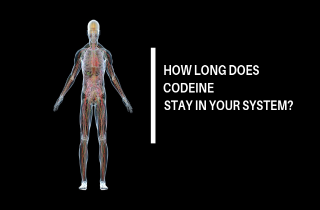The body quickly absorbs and metabolizes codeine narcotics.
So for most standard blood or urine screens, codeine will be detectable for 1-2 days. However, codeine is detectable in hair for longer periods of time. If you are looking for help with codeine abuse or addiction, you can find answers to your many questions and learn what happens during codeine addiction treatment programs in our comprehensive guide on Treatment and Help for Codeine Addiction. We also invite your questions about codeine at the end of the page.
Main codeine uses
Codeine is used as a pain reliever in cases of mild to moderate pain, and to help relieve coughing when over-the-counter medications aren’t strong enough. Codeine belongs to the opiate class of medications and it alters the brain and nervous system’s response to pain. This psychoactive effect can cause numbing effects in the body and suppress the body’s cough reflex, but it can also cause a euphoric high that people chase when they take codeine to get high.
How do you take codeine?
Codeine comes in tablet, capsule, and solution form. When used for medical reasons, codeine is taken orally. However, codeine can also be abused. Some abusers will drink excessive amounts of codeine cough syrup to try to achieve a euphoric high. Codeine abusers also chew or crush the tablets to release all the medication at once. They may also crush the tablets and either snort them, or dissolve them in water and inject the mixture into the blood. These modes of administration are not recommended, as they increase risk of dependence, overdose and death.
Peak levels and half life of codeine
Codeine starts to take effect quickly. It reaches peak levels in about 30 minutes, at 200 ng/ml. After peak effect, codeine has a half-life of about 3 hours.
Codeine drug testing: How long does codeine stay in the body?
Narcotics like codeine clear the body fairly quickly. Most likely, codeine is detectable by drug testing for only a couple of days after last use. In general, blood screens for codeine are the least likely way to detect the opiate drug, followed by urine and hair tests.
How long does codeine stay in blood?
Due to its short half-life, codeine doesn’t stay in the blood long-term. In fact, codeine will typically fall beneath detectable levels after a day. Blood tests will probably only be ordered in situations requiring medical treatment for potential overdose or other adverse effects.
How long does codeine stay in hair?
Hair follicle samples testing for drugs such as codeine is not standard for pre-employment or workplace drug screens and is only usually used to monitor people in drug treatment programs. Still, codeine can be detected in hair for about 90 days. This detection window depends on the length of your hair is and how much codeine you’ve taken in the past. Trace amounts of codeine will be harder to detect than chronic abuse.
How long does codeine stay in urine?
The exact amount of time that codeine is detectable in urine depends on the amount of codeine a person is taking, what formulation of the drug they’re using, and how long they’ve used it. Typically, codeine can be detected in urine for only 1 or 2 days. It can be detectable for slightly longer when someone’s last dose was a very large amount, or if someone has chronically abused codeine.
Codeine and addiction
Codeine is an addictive drug. In fact, codeine can be habit-forming in those who use it to manage long-term pain and those who abuse it intentionally. Codeine abusers experience withdrawal when they don’t have access to the medication and will crave codeine when it is no longer acting in the body. Codeine abusers and addicts are at a greater risk of overdose, as opiate tolerance leads them to taking higher and higher doses of codeine to achieve euphoric effect.
Problems with codeine?
Do you think that you have a problem with codeine? You probably do. If you struggle with codeine addiction, a doctor can refer you to therapies which will help, including medications and psychological treatment. So talk first with your primary physician and seek referral to an addiction specialist to learn more.
Codeine in your system questions
If we still haven’t answered your question(s) about codeine in the system, please leave your question(s) below. We are more than happy to respond to you personally, and will do so as quickly as possible. If we cannot answer your codeine question, we will refer you to someone who can.










Related Posts